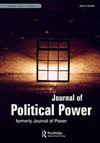From circulating liberalism to tech nationalism: U.S. soft power and Silicon Valley
IF 1.3
Q1 POLITICAL SCIENCE
引用次数: 1
Abstract
ABSTRACT The global internet was originally shoe-horned into making a U.S.-led international order in the post-Cold War. Soft power enthusiasts and the early architects of the global internet worked closely to turn global connectivity into a civilizing mission. Around the 2010s, the State Department embraced ‘internet freedom’ as a soft power strategy when U.S. dominance was challenged by global and regional counter-hegemons. I argue that the ‘tech Cold War’ is not new. But the emerging narrative aims to bolster the reputation of the U.S. government and the tech industry’s corporate power, thereby hoping to restore U.S. leadership in internet governance.从循环自由主义到科技民族主义:美国软实力与硅谷
摘要全球互联网最初是在冷战后由美国主导建立的国际秩序。软实力爱好者和全球互联网的早期设计师密切合作,将全球互联互通转变为文明使命。2010年代前后,当美国的主导地位受到全球和地区反霸权的挑战时,国务院将“互联网自由”视为一种软实力战略。我认为“科技冷战”并不是什么新鲜事。但新出现的叙事旨在提升美国政府的声誉和科技行业的企业实力,从而希望恢复美国在互联网治理方面的领导地位。
本文章由计算机程序翻译,如有差异,请以英文原文为准。
求助全文
约1分钟内获得全文
求助全文

 求助内容:
求助内容: 应助结果提醒方式:
应助结果提醒方式:


